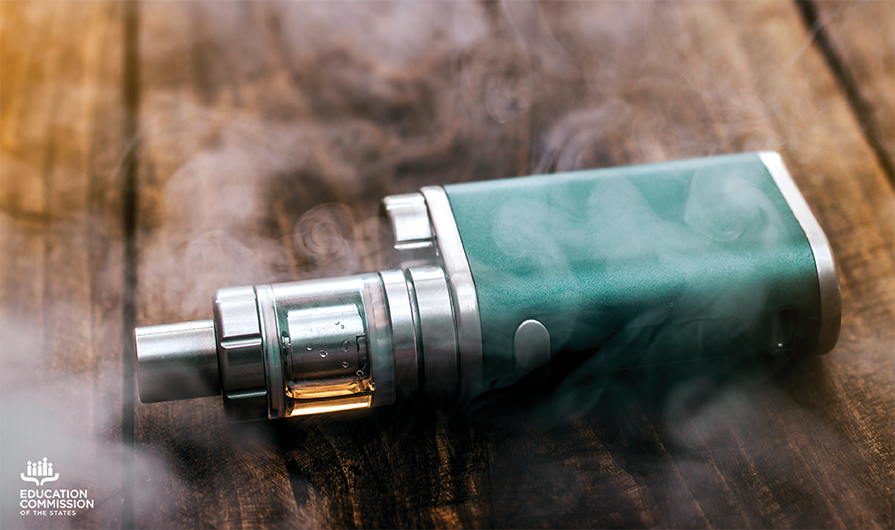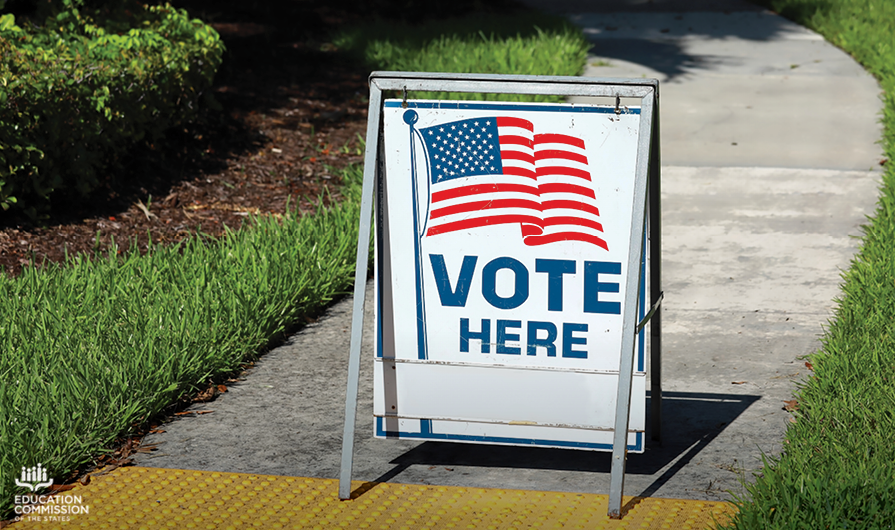Did you know nearly 1 in 5 high school students and 1 in 20 middle school children currently use electronic cigarettes? Between 2011 and 2018, e-cigarette use among high schoolers increased 78%. Additionally, one survey found two-thirds of e-cigarette users ages 15-24 do not know that e-cigarette products contain nicotine.
The U.S. surgeon general issued an advisory on e-cigarette use among school-age children, calling it a public health epidemic and arguing aggressive measures must be taken to protect youth from associated health risks. To this end, well-coordinated national, state and local programs can reduce and prevent youth tobacco use. Examples of these activities include raising tobacco product prices, prohibiting smoking indoors, raising minimum smoking ages and launching public awareness campaigns.
Before we review enacted 2019 state legislation and other state actions aimed at curbing youth e-cigarette use, here are common terms to know, informed by state policy definitions and a study of state bills regulating e-cigarettes and similar products:
- Alternative nicotine products provide for the ingestion of nicotine but do not contain tobacco. Alternative nicotine products may be chewed, inhaled, snorted, dissolved or otherwise consumed.
- E-cigarettes use a heating element and battery or electronic circuit to vaporize a liquid containing nicotine or other substances for inhalation.
- Vapor products are non-combustible products that are used to heat a liquid solution. E-cigarettes are one type of vapor product; others are vapor cartridges, tanks or pods. The U.S. Food and Drug Administration refers to these products as electronic nicotine delivery systems . Some state laws refer to ENDS, but may not limit regulation to nicotine-containing products.
- Vaping refers to the use of e-cigarettes and other vapor products.
Examples of 2019 State Legislation
Prohibiting vaping on school grounds
Florida S.B. 7012 renames the Indoor Air: Tobacco Smoke Act to the Indoor Air: Smoking and Vaping Act and prohibits vaping near school property. It also defines vape, vaping, vapor and vapor-generating electronic device.
Kentucky H.B. 11 requires local boards of education to prohibit use of tobacco, alternative nicotine and vapor products on school property. Local boards can opt out of the bill’s requirements for up to three years after the effective date.
Montana H.B. 413 prohibits the use of vapor products, e-cigarettes or similar devices, and alternative nicotine products on school grounds.
Amending clean indoor air acts
Nevada S.B. 263 expressly applies the Nevada Clean Indoor Air Act to the use of electronic smoking devices. The act prohibits smoking in school buildings and on school property, and includes the use of vapor products and e-cigarettes in the definition of smoking.
Raising legal age to purchase tobacco
Utah H.B. 324 tiers the legal age for purchasing and using tobacco and e-cigarettes. Beginning July 1, 2020, the legal age is raised to 20. Beginning July 1, 2021, the legal age raises to 21.
Washington H.B. 1074 raises the legal smoking age to 21 to decrease student access to tobacco and vapor products.
Requiring instruction on tobacco and e-cigarettes
Virginia H.B. 1881 amends instruction requirements in elementary and secondary schools to specifically address the health and safety risks of using tobacco, nicotine vapor and alternative nicotine products.
Other State Action
In addition to legislative action, states are establishing task forces enacting broad bans against flavored vaping products, and pursuing legal action.
A task force established by the Kansas Board of Education recently presented at a state board meeting. The task force covered a variety of topics, including the use of signs to deter vaping in schools, potential legislation for the next session and plans to assist schools with issues related to student vaping. Additionally, the state department of health and environment supported the development of a toolkit to aid schools and districts in preventing the use of vaping products.
Michigan Gov. Gretchen Whitmer issued a ban of online and retail sales of flavored nicotine vaping products.
The attorney general of North Carolina filed a lawsuit against eight e-cigarette companies for allegedly marketing their products and materials to high school and middle school students.
For more on legislation related to e-cigarettes and student health, see our State Education Policy Tracking database, which we update regularly. And tomorrow, come back to Ed Note for a blog post that looks more closely at the disciplinary actions and preventative measures states and school districts are taking to discourage the use of vaping products among students.
















